
Back to Blogs
Discover
An Art Lovers Weekend in Bury St Edmunds
Arty Bury St Edmunds
For the art lovers amongst us, the beautiful market town of Bury St Edmunds is the perfect place to while away the weekend.
With so much to see and do, it’s worth spending a couple of days exploring the many works of art found here. We’ve put together a few suggestions for a great weekend exploring the wonderful artistic side to Bury St Edmunds.
DAY 1
8:30–10.30 – A Drive Around Bury St Edmunds Followed By Breakfast
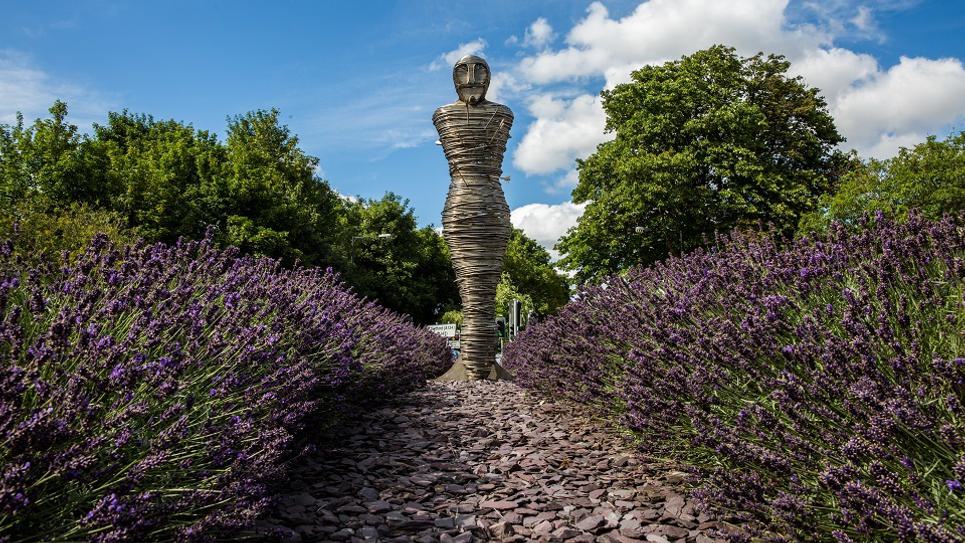
One of the most famous things about Bury St Edmunds is that almost every major road junction contains something artistic.
We’re allocating plenty of time for this because there is simply so much to see and appreciate.
The initiative was led by Bury in Bloom, and there are some absolute gems amongst them.
One of the most famous pieces of artwork and a must see is the Flight of Peace sculpture. Situated on the Lady Miriam Way roundabout, this sculpture commemorates the arrival of the US Air Force at Rougham Airfield in 1943. As you can imagine, this particular sculpture attracts both artists and historians in equal measure.
Another piece of roundabout art with significant historical meaning is the Grain sculpture. This can be found at the King’s Road roundabout and is a constant reminder of the many corn windmills that were once situated close by.
At the Southgate Green roundabout, the legend of Saint Edmund is depicted once again with the wooden carving of the wolf, sitting howling in front of the severed head of Saint Edmund.
Each junction and roundabout brings something new, so take your time exploring each piece of magnificent art as you travel around the town.
Then it's time for breakfast.
Bury St Edmunds is filled to the rafters with friendly cafés, all offering delicious foods.
10.30am - 11.30am – Abbey Gardens
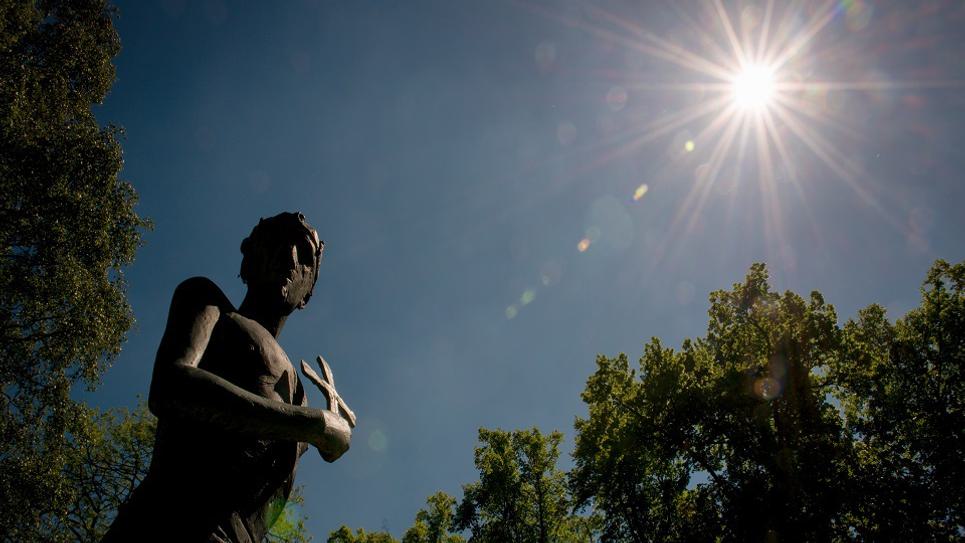
A visit to Bury St Edmunds wouldn’t be complete without a visit to the famous statue of Saint Edmund by Dame Elisabeth Frink, an English sculptor and printmaker best known for her bronze outdoor sculptures. Her Times obituary noted the three essential themes in her work as "the nature of Man; the 'horseness' of horses; and the divine in human form".
The statue can be found in the Great Churchyard alongside the cathedral and is closely guarded by a lone wolf companion.
Inside the Abbey Gardens will also find a stunning oak book carved by Den Humphrey near to the Grounds Cafe. The book depicts the legend of St Edmund and the wolf and is a stunning piece of carving. Next to it is a beautiful carving of a wolf by artist Luke Williams.
12:00–13:00 – Lunch
You’ll be spoilt for choice when it comes to finding somewhere to enjoy a delicious meal. With plenty of cafés and local pubs serving home-cooked food, you’ll be able to spend an hour recharging your batteries before heading out to continue your exploration of the artistic side of Bury St Edmunds.
13:00–17:00 – Art Galleries
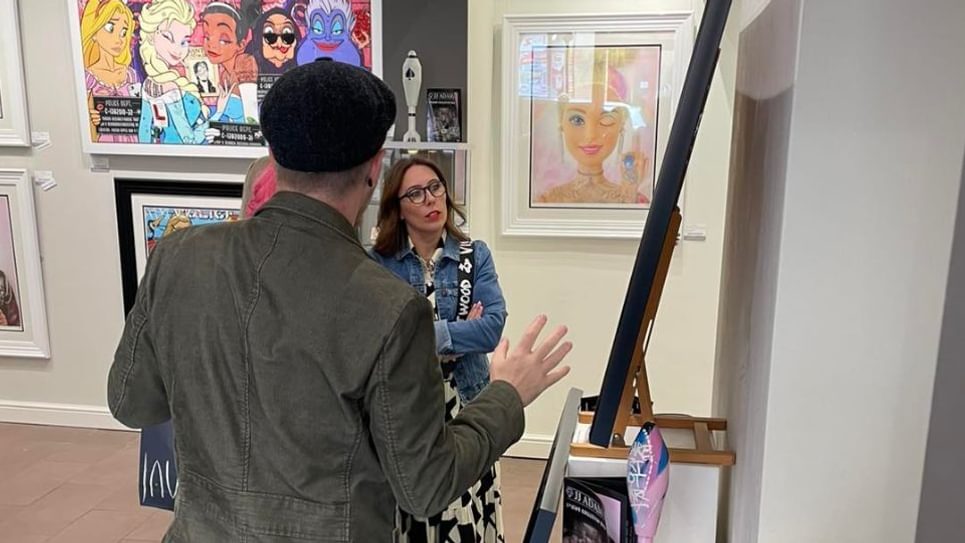
Chelmer Fine Art
The afternoon is dedicated to the many glorious galleries to be found in Bury St Edmunds.
You can take your time exploring each of these – every one has something different to offer.
Chelmer Fine Art
Chelmer Fine Art is the gallery to visit for those who love to appreciate the work of contemporary artists. Here you’ll find work from artists such as Alexander Millar, Caroline Shotton and John Myatt.
Clarendon Fine Art
With over 80 beautiful galleries including 13 on board ocean liners, Clarendon Fine Art offer an exclusive experience in art acquisition, specialising in unique original works and limited edition statement pieces from some of the world’s most dynamic and talented street, pop and contemporary artists.
They have also built a superb collection of rare signed editions from some of the greatest modern masters working during the 20th century, including Lowry, Chagall and Warhol.
Since they opened their flagship gallery in Mayfair in 2010, they have been creating inspirational bespoke experiences for every individual, from first time purchaser to established collector.
The Hunter Gallery
The Hunter Gallery on Angel Hill is the place to visit to see sculptures and paintings lovingly created by local artists.
The gallery exhibits well known local artists from Suffolk, Norfolk and Essex alongside some of the UK's most respected creators of art. We specialise in art for the home in a wide range of styles and media with something to suit all tastes and budgets.
They are proud to stock the work of many leading artists, including Caroline Bailey RSW, Harry Brioche, Colin Carruthers, Alexander Debenham, Mark Eldred, Peter Heard, Sally Martin SEA, Edward Noott RBSA, Alfredo Palmero, Huw Williams and many more.
Visit to see their changing exhibitions.
Handmade Shop and Gallery
If handcrafted, lovingly made art is your thing, then you must visit the Handmade Shop and Gallery in St John's Street during your visit to Bury St Edmunds. This wonderful gallery displays a huge range of original handmade work by a variety of artists. Here you’ll find unique pieces of artwork, including prints, textiles, glass work, paintings and jewellery. This is the perfect place to pick up a souvenir or a gift for a loved one.
ReallyVeryNice Art Gallery
Open from 10am until 4pm Tuesday to Saturday, the ReallyVeryNice Gallery in Churchgate Street is a must see for any art lovers exploring Bury St Edmunds. They pride themselves on displaying exquisite yet affordable pieces of art in their gallery and shop.
Kim Whittingham
Kim Whittingham is a watercolour artist and illustrator based in Bury St Edmunds, specialising in house portraits and business portraits.
She also paints images of landmarks in Bury St Edmunds and you can buy greetings cards, prints, bone china mugs and tote bags of some of her most popular landmarks at her gallery in Langton Place.
Art in East Anglia
Art in East Anglia was created to promote and showcase the work of talented East Anglian Artists. East Anglia has an abundance of artists and creative people. Perhaps it's our famous big skies, forests and wonderful coastline that inspires people to want to create! The Art in East Anglia directory began as a small Artist community and has grown into an online directory and marketing platform that helps artists promote their work and Art lovers to discover local artistic talent. They now have an Online Marketplace and have opened a dedicated gallery in Bury St Edmunds.
The Bury Framing Centre
The Bury Framing Centre is an independent bespoke framing business and retail gallery for local artists. They have a rotating program of exhibitions to showcase a range of artists’ work that adds to the vibrancy of the independent businesses found along St John’s Street. They aim to create a hub of original work with a view to make this a destination to see exciting and thought-provoking art.
Dinner
Bury St Edmunds has everything from award-winning fine dining to quality Suffolk home-cooked pub grub, each with their own unique atmosphere.
Whether it’s a family get together or a romantic meal, finding the perfect place to eat in Bury St Edmunds is easy as there are so many choices to tempt your taste buds. You can easily while away an afternoon or evening with friends in Suffolk's foodie capital, which is home to the county's only Michelin-starred restaurant and the county's only Michelin Bib Gourmand awarded restaurant. For beer lovers, Bury St Edmund is the home of Greene King which has been brewing beer in the town for more than 200 years.
Find a Place to Eat now.
DAY 2
Art in Bury St Edmunds
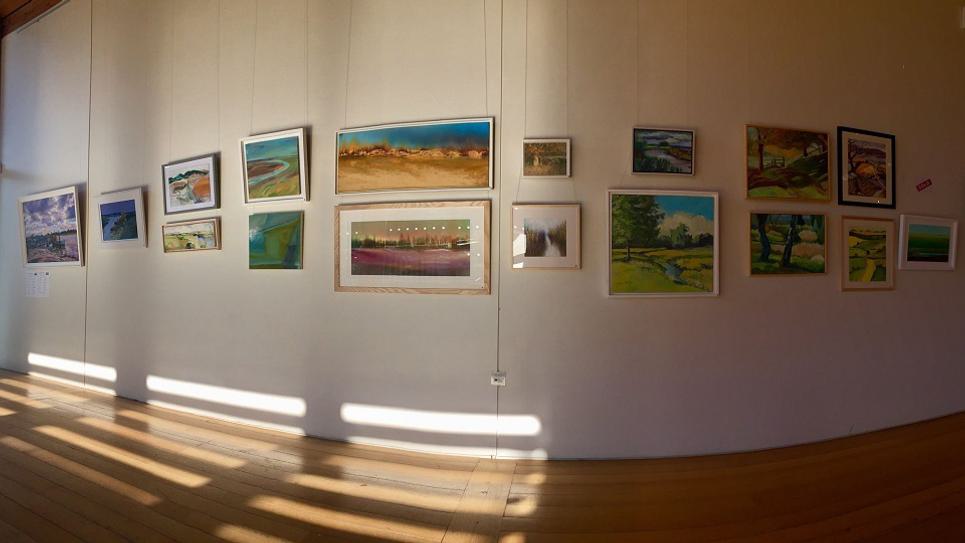
The Apex Gallery - free to visit
Apex Gallery
The Apex Gallery in the arc shopping centre is well known for its contemporary paintings and sculptures. Situated in a beautiful part of the town, you’ll be able to enjoy a relaxing drink whilst exploring the stunning works of art on display and appreciating the incredible architecture of the building.
The Gallery holds a range of exhibitions throughout the year, featuring works by emerging and established artists, as well as engaging with West Suffolk's various community art groups, offering them an opportunity to display their work in a professional environment.
Bury St Edmunds Guildhall
At the Bury St Edmunds Guildhall discover some of the prominent figures in Bury St Edmunds' history in a beautiful collection of paintings on display, including a unique painting of Kings James I commissioned in 1610 to commemorate the two charters passed by the King to effectively create Bury St Edmunds first form of local government.
St Edmundsbury Cathedral
St Edmundsbury Cathedral regularly features exhibitions by local artists as well as artists that explore Christian themes. Exhibitions can often be found in the Cathedral cloisters or inside the Cathedral itself.
The Cathedral's Treasury also has many beautiful works of art including a copy of The Bury Cross or Cloisters Cross, as it is now known, which is made from walrus ivory and believed to be from the Abbey of St Edmund in Bury St Edmunds. It was discovered in a Zurich bank vault at the end of World War II. The sculptor is not known but it is believed to have been created from around 1150-1160. The original is on display at The Metropolitan Museum of Art in New York.
Inside the Cathedral The Banner of St Edmund, an embroidered banner depicting the martyrdom of St. Edmund by the Danes by local artists the late Sybil Andrews.
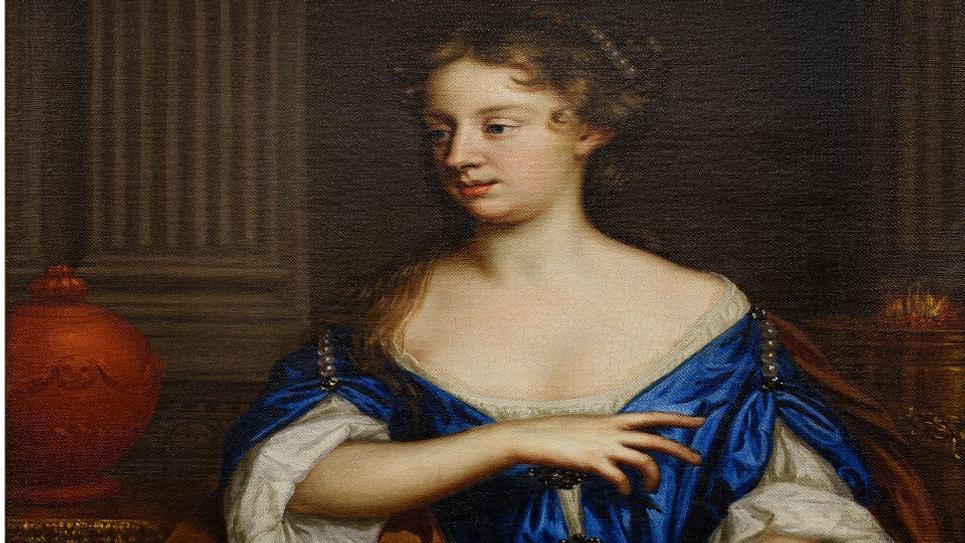
Mary Beale - a self portrait. Photo: Tom Soper.
Moyse's Hall Museum
In Moyse's Hall Museum, you can find fine art by renowned local artists Mary Beale (England's first professional female painter) and Sybil Andrews, best known for her stylized linocuts portraying daily life.
You can see an extremely rare piece of jewellery with possible links to St Edmund himself. The ornate gold jewel, known as the 'Edmund Jewel' may have even been used by the great king himself and was discovered by someone metal detecting in a field in Drinkstone in 2014.
It is believed to be an aestal, a 9th century pointer used by people in high status for reading at a time when the majority of people were illiterate. Aestals themselves are believed to be extremely rare – there are thought to be less than 10 in Europe.
The Edmund Jewel dates back to the ninth century, Edmund was martyred in 869AD, so its unknown whether the jewel was made before or after his death and who designed it. It was found where what would have been part of the landholdings of the Abbey of St Edmund; land that some academics have suggested originally had connections to the King himself, while the rarity of the Jewel, coupled with its purpose means it is likely that, if it did not belong to Edmund himself, it would have been made and used by someone in high status in the Church.
Related Posts
Related Blogs

News
Days Out You Can Enjoy From…
There’s even more to explore on Bury St Edmunds’…

News
Luke Jerram's Helios Art…
A new artwork of the sun by Luke Jerram will be coming…

News
Discover Art in Bury St…
Bury St Edmunds is fast becoming known for art – a…

News
Roundabout Art Tells the…
From the dramatic steel figure of St Edmund to the…
Latest news

News
New in Bury St Edmunds For 2026
A sneak peak into new attractions visitors can enjoy in Bury St Edmunds in 2026.

News
Where to See Snowdrops in Bury St Edmunds and Beyond
Celebrate winter and the first signs of Spring with a walk amongst the snowdrops in Bury St Edmunds & Beyond...

News
Places to sit by a roaring fire in Bury St Edmunds & Beyond
Warm up by a roaring fire this winter in Bury St Edmunds & Beyond...

News
Tourism in Bury St Edmunds Hits Record Value, New Figures Reveal
The value of the town’s tourism economy rose in 2024 to a new record-breaking high of £55.9million.

News
Bury Tour Guides to launch new tours next year after successful 2025
Bury St Edmunds Tour Guides to Introduce new tours in 2026 and continue the successful Food and Drink Tours!

News
Baby It's Cold Outside... Things To Do When the Weather Turns Frosty
Just because the temperature’s dropped doesn’t mean the fun has to! If you’re visiting town during the chillier months, there’s still plenty to see, do, and experience.
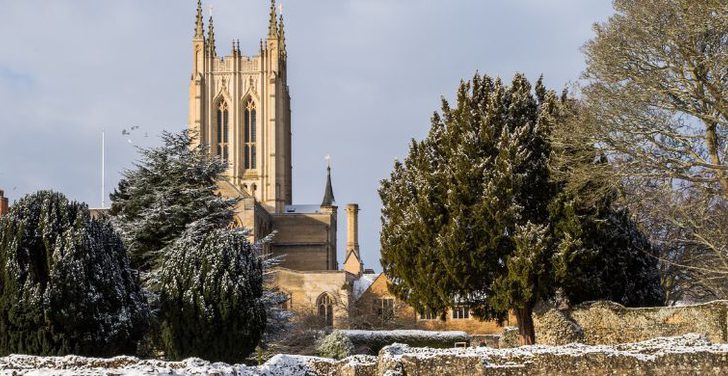
News
Savour The Winter Season in Bury St Edmunds
Ways to mark the winter season in Bury St Edmunds

News
Town’s Museum Forms New Partnership with US Museum
Moyse’s Hall Museum will be forging links with a museum in Salem Massachusetts as part of a project to explore the shared history of the infamous witch trials.

News
Bury St Edmunds Comedy Festival 2026 Line-Up
The 2026 line-up includes Seann Walsh, Luke Wright, Pauline Eyre and Daliso Chaponda!



